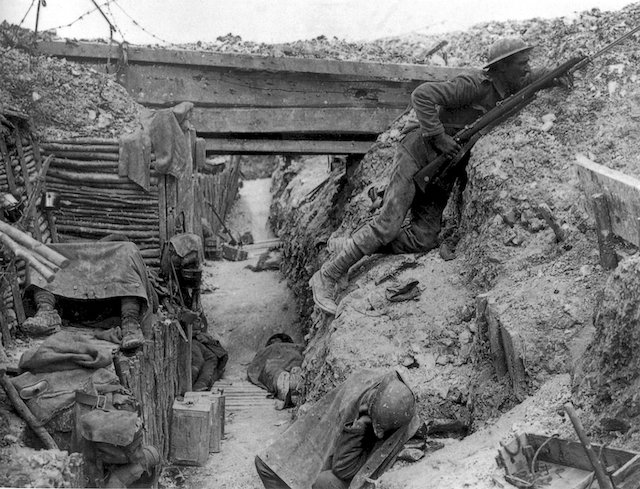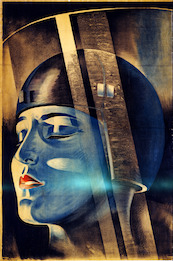The roots of the our ruling class’ disdain for protest movements can be traced all the back to World War I. (Part 2 of a two-part essay)

Trench warfare during World War I. (Wikimedia Commons)
Upon U.S. entry into the war, in 1917 the Wilson administration proposed and a compliant Congress almost immediately passed the Espionage Act, a direct attack on American press freedom. The law criminalized newspaper journalists who dared to oppose the war, question the official narrative, or encourage dissent. Massive fines and stiff prison sentences were dealt out with regularity throughout the war. The postmaster general, Albert Burleson, used the Act with particular vigor, banning socialist and anti-war publications from the mails, which then was the only serious method of media distribution.
The actions of Burleson and the government were manifold and nefarious. Bilingual “watchdogs” (mainly university professors) were assigned to monitor the then-vibrant foreign-language publications for “material which may fall under the Espionage Act.” Burleson went past the foreign press and denied mail access to any publication that even vaguely criticized the war, or dared, as he declared, “to impugn the motives of the government” or even criticize “improperly our Allies.” Thus, even the esteemed liberal journal The Nation was banned in September 1918, simply for criticizing the pro-war labor leader Samuel Gompers. This official trampling of press freedom encouraged local organizations to take mass surveillance and thought policing to ever-more extreme levels. For example, the Iowa Council of Defense urged each member to spy on his fellow citizens and “find out what his neighbor thinks.”
Attorney General Thomas Gregory even boasted of his having crafted an effective mass surveillance state. Indeed, it was so effective that it can now be seen as a precursor — though less technologically advanced — of the digital surveillance state that NSA whistleblower Edward Snowden unmasked during the Obama years. In April 1918, Gregory claimed, “Scores of thousands of men are under constant observation throughout the country.” The connections to the present day are manifold, relevant, and discomfiting. It was the nearly century-old Espionage Act, in fact, that Barack Obama used to wage his war on leakers, including Chelsea (formerly Bradley) Manning and Edward Snowden. Indeed, the liberal darling Obama prosecuted more persons under the Espionage Act than all of his predecessors combined.
Still, while Obama indicted leaker after leaker, i.e., journalistic sources, his justice department stopped short of indicting a publication itself, citing the potentially dangerous precedent it would set. The Trump administration has followed in Obama’s footsteps by bringing charges against Julian Assange, who — like him or not — runs a viable publication, WikiLeaks. While WikiLeaks itself has not been indicted, that is certainly still a possibility. While the mainstream U.S. press failed to rally to Assange’s side, it would behoove them to do so. If Assange is jailed or WikiLeaks is shut down, there is nothing to stop Trump or future presidents from indicting officials in the Washington Post or New York Times or the publications themselves for printing classified information gleaned from leakers. By then, using World War I vintage tools, the war on the press will be over, the federal government triumphant once and for all.
American Propaganda at Home
When the United States declared war, many millions of Americans remained uncertain about the need for intervention and skeptical of the official justifications. After all, Democrats won the presidency in 1916 on the popularity of a specifically anti-war platform. Such sentiments were hardly vanquished in April 1917. That presented Wilson with a serious problem, one that needed to be solved immediately. The most prominent, and infamous, government answer was George Creel’s Committee on Public Information (CPI). While Wilson and Creel vehemently protested that CPI would not peddle propaganda, that’s exactly what the organization felt compelled to do: to “cultivate — even to manufacture” favorable public support for the war, in the words of historian David M. Kennedy.
What followed bordered on the ridiculous. Countless pamphlets were produced depicting German troops as rabid beasts, often shown as strangely threatening to white American women. The teaching of German was banned in many local school districts, as were history textbooks seen as too pro-German. CPI also collaborated with the hawkish National Board for Historical Service to craft and distribute various “war study courses” to the nation’s schools. Education, too, is a regular victim of the warfare state.
Creel had few compunctions about his work and left behind an instructive legacy of unsubtle statements. He unapologetically described his job as “the fight for the minds of men, for the conquest of their convictions.” His methods were varied and increasingly nefarious. CPI unleashed 75,000 “Four-Minute Men” on local communities. They were prominent citizens with reliably pro-war viewpoints who whipped up support through millions of brief speeches across the nation. Creel’s agency also distributed 75 million copies of pamphlets explaining the official government case for war. What’s more, the Committee even published pro-war advertisements in popular journals such as the Saturday Evening Post to shamelessly persuade the people. Consumerism, it seemed, had finally dovetailed with government propaganda.
The War on “Hyphenated” Americans
“Any man who carries a hyphen about with him carries a dagger that he is ready to plunge into the vitals of the Republic.” ~ Woodrow Wilson (1919)
Nativism and xenophobia are as American as apple pie, and are pervasive themes in U.S. history. However, the flames of anti-immigrant sentiment reached a fever pitch in the World War I era. By then, the recent wave of new immigrants — Italians, Poles, Slavs, and Jews — outnumbered the old-stock immigrants composed of Western and Northern Europeans. This inspired fear among native Anglo Americans. Just before the war, Henry Ford’s automotive workers on the assembly line attended a factory school for immigrants in which the first English sentence students learned was “I am a good American.”
By 1916, even the supposedly progressive Wilson framed his campaign partly around the concept of Americanism, as defined by the Anglo elite. So-called hyphenated Americans had no place in a United States, and new loaded terms such as “100 percent Americanism” took hold. Even before the war, Wilson gave voice to xenophobia, directed at once-admired German-Americans, as he stated, “There are citizens of the United States, I blush to admit, born under other flags but welcomed under our generous naturalization laws … who have poured the poison of disloyalty into the very arteries of our national life…. Such creatures … must be crushed out.” Then, during his official war address, he claimed that there were “millions of men and women of German birth and native sympathy who live amongst us…. If there should be disloyalty, it will be dealt with, with a firm hand of repression….” It was.
Scapegoating of German and new immigrants and the vigilantism against them straddled the lines of official and unofficial policy. Quasi-vigilante groups such as the massive American Protective League (APL) even managed to enter into a formal relationship with Gregory’s Justice Department. APL members, who stood 250,000 strong by war’s end, spied on neighbors and co-workers, sniffing out even the vaguest hints of dissent. Owing to his vitual deputization of the APL members, Attorney General Gregory went so far as to boast, “I have today several hundred thousand private citizens … engaged in … assisting the heavily overworked Federal authorities in keeping an eye on disloyal individuals and making reports of disloyal utterances.”
APL members rapidly slid into more nefarious arenas — burglary, illegal wiretapping, slander, citizens’ arrests, opening private mail, and, eventually, even physical violence. For perhaps the first time in U.S. history, whites — mostly Germans, pacifists, and socialists — were lynched wholesale. Some were viciously tarred and feathered, others outright murdered. The perpetrators almost never faced punishment. In one representative case, a German-American who had actually attempted (unsuccessfully) to join the U.S. Navy was humiliated, paraded through the streets, and murdered before a cheering crowd. At their trial, the ringleaders wore red, white, and blue ribbons. Their defense counsel described their act as “patriotic murder.” Within 25 minutes the jury found them all not guilty. The “respectable” Washington Post then commented, “In spite of excesses such as lynching, it is a healthful and wholesome awakening in the interior of the country.”
Which all links to the relevant present. Donald Trump’s 2016 campaign calls to “ban Muslims” coming from certain countries, and to “take out” the families of terrorists; and his characterizations of some Mexican and Central American refugees and migrants as “rapists” no doubt set the conditions for, and incited, a recent wave of domestic terror attacks. True, violence against Muslims — which first manifested in the highly emotive post–9/11 Bush years — and Hispanics (including the recent mass shooting in El Paso, Texas), and the recent rise in attacks on Jewish communities do not rise to the level of the First World War. Nonetheless, such actions follow in the mold of the xenophobia, racism, and alarmism the Great War produced.
Déjà Vu All Over Again
The American people live, to a large extent, in the shadow of the world the Great War created. All war, especially war on such a grand scale, inevitably suppresses dissent, curtails liberty, and centralizes power in the federal government. Not only did that occur in World War I, but it did so to such a degree that the relationship of Americans to the federal government was completely transformed. U.S. presidents now unilaterally wage war — at home and abroad — with near total impunity.
It seems that while World War I did end, the post–9/11 “terror wars” may never come to a close. A major reason for that is the century-long centralization of foreign-policy and war-making power in the office of the president. Though Congress actually sanctioned (or rather rubber-stamped) war in April 1917, the Great War nevertheless transferred massive power to the executive branch. Indeed, Wilson’s unilateral military expeditions against Russian communists when he (and later his successor, Warren G. Harding) intervened in the Russian Civil War (1918-20) were a harbinger of things to come, great-grandfather to today’s unsanctioned interventions (and killing) in Libya, West Africa, Syria, and beyond. In retrospect, World War I and its more devilish step-child, the Second World War, proved to be the last two actual declared.
What’s more, the tacit — yet wildly vague and open-ended — congressional “authorizations” for force in Afghanistan (2001) and then Iraq (2002) bear a striking resemblance to the legislative rubber-stamp in April 1917. Wilson had said as much in his war address. It was, he declared, the “[executive branch] upon which the responsibility of conducting war and safeguarding the nation will most directly fall.” And indeed it would. Today’s executive-as-emperor political culture is partly an outgrowth of Wilson’s precedent.
Political tribalism, no doubt prevalent today, was also common during the First World War. In spite of the cynical announcement of Republican Sen. Henry Cabot Lodges, a fierce Wilson opponent — “When this country is at war, party lines will disappear…. Both Democrats and Republicans must forget party in the presence of the common danger” — Lodge intended all along to criticize Wilson and the Democrats for their “insufficient vigor” in war prosecution. Much the same has unfolded in the “forever wars.” Bush and the Republicans pressured early Democratic acquiescence, but Dems rebelled and criticized (rightly) Bush’s failing Iraq War from 2006 to 2008. Only later, when one of their own — Barack Obama — was in office, did they suddenly support the war expansion, and it became the Republicans who portrayed the president as weak on terror. The formula flipped again when Trump took office. War, whether in 1917 or 2019, is as politically partisan as any other issue.
When the president filled the power vacuum in World War I, and Congress enabled him, it became clear that the federal courts could not and would not save liberty. Repeatedly, the Supreme Court upheld both the Espionage and Sedition Acts. As Justice Oliver Wendell Holmes, once a darling of Progressives, wrote in Schenck v. United States, “when a nation is at war many things that might be said in time of peace are such a hindrance to its effort that their utterance will not be endured.” With those words Holmes essentially spiked the promise of freedom in future wars. The same is true today, as the Supreme Court has failed to overturn the USA PATRIOT ACT or the much-abused Authorization for the Use of Military Force (AUMF), or to shut down Guantanamo Bay and the Obama-escalated drone assassination program.
Modern liberalism, and the Democratic Party — as the Great War demonstrated — won’t save liberty either: in 1917, the vast majority of self-proclaimed Progressives sold out and followed “their man” Wilson into war, just as neo-Progressives sheepishly followed Obama down his path of war expansion. Democrats, Progressives, and too many (small “l”) liberals inflicted perhaps permanent damage on their once-optimistic social philosophy of progress. As such, according to David Kennedy, “the idea of the ‘people’ as good and educable, gave way to the ‘masses,’ brutal and volatile.”
The pro-war Progressive Walter Lippmann sensed this by war’s end, and proposed radical, undemocratic measures. The solution to man’s irrationality was to abandon real democracy and create an “intelligence bureau” to pursue “the common interests that very largely elude public opinion … managed only by a specialized class.” From that era, then, one may date the “substantial nagging fear of the people among modern liberals.”
It may be said, then, that the true casualty of the First World War was not just liberty, but the very “progressive” soul, the perhaps always-misplaced faith in government as a potential force for good. It is this cynical postwar world that Americans inhabit.
Bibliographical note: This piece draws extensively on David M. Kennedy’s book Over Here: The First World War and American Society as well as the author’s own teaching notes as lecturer from his time at West Point. Interested readers should read Kennedy’s work in full for a broader and more in-depth treatment of this massively complex subject.
Written by Maj. Danny Sjursen for TruthDig ~ February 20, 2020
 ~ Author ~
~ Author ~
Maj. Danny Sjursen is a retired U.S. Army officer and former history instructor at West Point. He served tours with reconnaissance units in Iraq and Afghanistan…
The views expressed in this article are those of the author, expressed in an unofficial capacity, and do not reflect the official policy or position of the Department of the Army, Department of Defense, or the U.S. government.
 FAIR USE NOTICE: This site contains copyrighted material the use of which has not always been specifically authorized by the copyright owner. We are making such material available in our efforts to advance understanding of environmental, political, human rights, economic, democracy, scientific, and social justice issues, etc. We believe this constitutes a ‘fair use’ of any such copyrighted material as provided for in section 107 of the US Copyright Law. In accordance with Title 17 U. S. C. Section 107, the material on this site is distributed without profit to those who have expressed a prior interest in receiving the included information for research and educational purposes. For more information go to: http://www.law.cornell.edu/uscode/17/107.shtml
FAIR USE NOTICE: This site contains copyrighted material the use of which has not always been specifically authorized by the copyright owner. We are making such material available in our efforts to advance understanding of environmental, political, human rights, economic, democracy, scientific, and social justice issues, etc. We believe this constitutes a ‘fair use’ of any such copyrighted material as provided for in section 107 of the US Copyright Law. In accordance with Title 17 U. S. C. Section 107, the material on this site is distributed without profit to those who have expressed a prior interest in receiving the included information for research and educational purposes. For more information go to: http://www.law.cornell.edu/uscode/17/107.shtml
